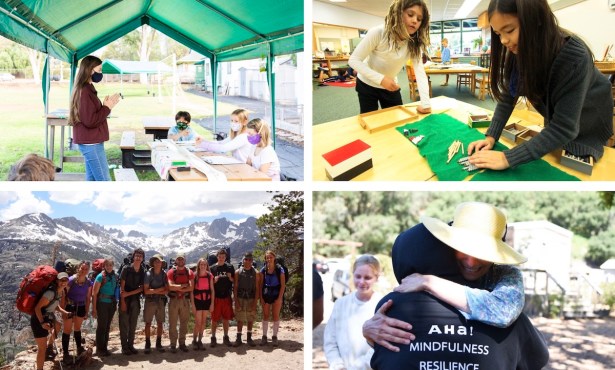Managing Stress for All Ages with AHA!
Social and Emotional Intelligence for Teens — and Their Parents

Sure, kids are cute and fun and can perhaps even lend great meaning to our flicker of existence aboard this beautiful blue dust ball hurling through empty space. But you know what else? Parenting is tough. Got teens? Even tougher. Pile on the day-to-day stressors common among most modern earthlings, and your connection to your kids can come apart faster still.
Fortunately, there’s AHA!, which for years has been helping teens — and their folks — be better versions of themselves. On the grown-up front, the nonprofit’s team of social-emotional educators, parent coaches, and therapists is providing extensive parent education and support this year — from stand-alone groups to multi-class series, all with Spanish interpretation.
For more info, we caught up with Melissa Lowenstein, AHA!’s director of programs.
Describe parent stress. In general, parents are overscheduled and feel they don’t have enough time or energy to devote to parenting. Our culture celebrates overdoing, overachieving, and busyness, and many parents never feel like they are doing enough. We’re seeing exhaustion and overwhelm. Rates of anxiety and depression in young people have skyrocketed in response to the pandemic, and parents are unsure about how to help. Parents of teens are especially impacted because the natural arc of teen development can make it more challenging for parents to relate honestly and deeply with their child.
How does parent stress impact student success? It can be difficult for under-resourced parents to make time or learn strategies for supporting their child. An under-resourced adult who isn’t acting as a role model for living an emotionally and relationally healthy life can’t effectively resource a child who is struggling. Children pick up on parental stress, and it adds to their own burden, which can mean difficulty with school or other areas of life.
When parents can better manage their stress, how does that help children? Children are exquisitely sensitive to parental stress. When it goes unacknowledged and unmanaged, it often comes out as short-temperedness, inconsistency with boundaries, or distancing between the person suffering in silence and the others in their family. A parent who learns ways to manage when things are hard and uses those tools where their children can witness them is a fantastic role model. When children see an important adult in their lives facing adversity and doing what’s needed to right themselves, they learn how to do the same. Even if they’re never taught explicitly, they absorb it and model it right back.
What subjects are tackled in parent classes? The five-class series at Carpinteria Unified School District (on Zoom) and Goleta Valley Junior High (at the campus in spring, with dinner and childcare) looks at parenting in the context of developing key aspects of social-emotional intelligence. [We cover] self-awareness, self-management, social awareness, relationship skills, and responsible decision-making, all [of which are] foundational to good parenting. No quick trick or standalone parenting strategy can replace parents taking time to self-examine and work on their own relational and emotional competency.
The greatest thing about this series is that the skills and knowledge parents gain are incredibly useful in all relationships: partnerships, relationships at work, friendships, and other family relationships. Social-emotional learning training is much desired by employers these days, so we will offer those who complete the five classes a certificate of completion to share with current or prospective employers.
You’ve been at this for a while, right? We have offered parent groups consistently since our beginnings in 1999. For most of that time, we offered these groups only to parents of teens in AHA! after-school, summer, and Peace Builder programs. In response to demand from schools who wished to offer more support to their parents, we developed the five-class series for this school year. Groups are always offered by donation.
Best way to sign up? Reach out to Joy Elizondo at joy.ahasb@gmail.com or call the office.
1209 De la Vina St., Ste. A; (805) 770-7200; ahasb.org




You must be logged in to post a comment.